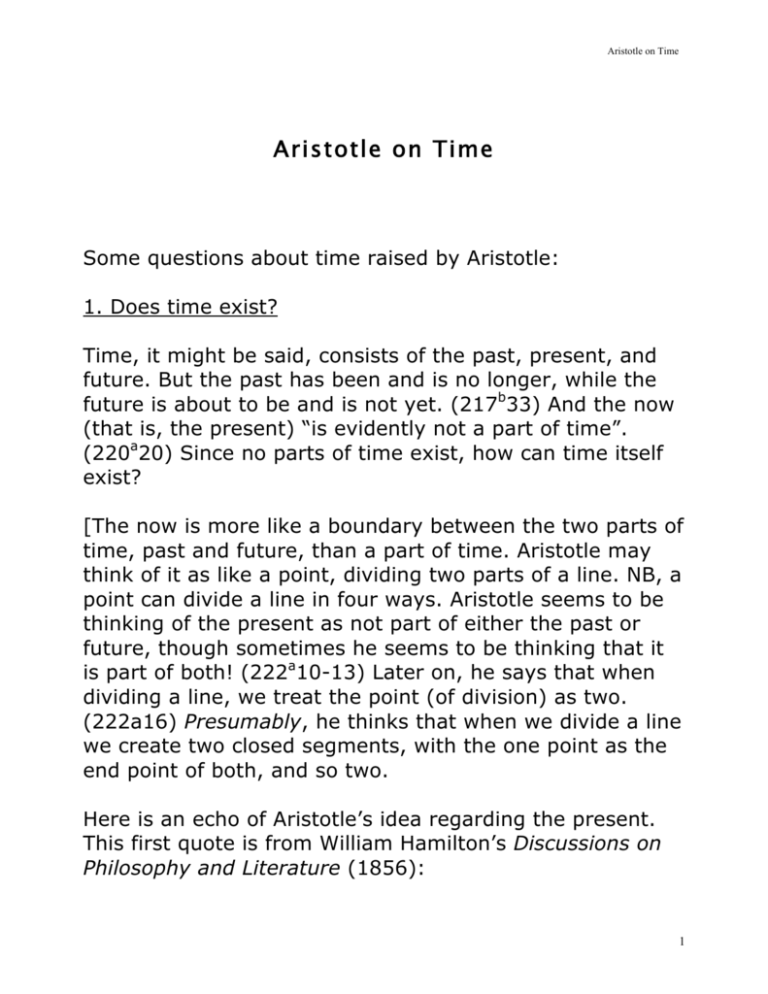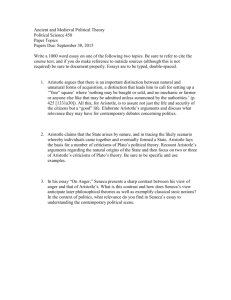Aristotle (Time)
advertisement

Aristotle on Time Aristotle on Time Some questions about time raised by Aristotle: 1. Does time exist? Time, it might be said, consists of the past, present, and future. But the past has been and is no longer, while the future is about to be and is not yet. (217b33) And the now (that is, the present) “is evidently not a part of time”. (220a20) Since no parts of time exist, how can time itself exist? [The now is more like a boundary between the two parts of time, past and future, than a part of time. Aristotle may think of it as like a point, dividing two parts of a line. NB, a point can divide a line in four ways. Aristotle seems to be thinking of the present as not part of either the past or future, though sometimes he seems to be thinking that it is part of both! (222a10-13) Later on, he says that when dividing a line, we treat the point (of division) as two. (222a16) Presumably, he thinks that when we divide a line we create two closed segments, with the one point as the end point of both, and so two. Here is an echo of Aristotle’s idea regarding the present. This first quote is from William Hamilton’s Discussions on Philosophy and Literature (1856): 1 Aristotle on Time In regard to Time Past, and Time Future there is comparatively no difficulty…. But Time Present, when we attempt to realize it, seems to escape us altogether—to vanish into nonentity. The present cannot be conceived as of any length, of any quantity, of an protension [duration?], in short, as any thing positive. It is only conceivable as negation, as the point or line (and these are only negations) in which the past ends and the future begins—in which they limit each other. The following paragraph, which might have been influenced by the previous one, is from Shadworth Holloway Hodgson’s book Philosophy of Reflection (1878): Crudely and popularly we divide the course of time into Past, Present, and Future; but, strictly speaking, there is no Present; it [the present? the course of time?] is composed of Past and Future divided by an indivisible point or instant. That instant, or time-point, is the strict present. What we loosely call the present is an empirical portion of the course of time, containing at least a minimum of consciousness, in which the instant of change is the present time-point.] 2 Aristotle on Time 2. Is the NOW always the same or always changing? (218a8-29) If the NOW is always changing, then a past NOW must have ceased to be, in order to be replaced by a present NOW. When did that happen? Surely not at the very time that the past NOW existed? Surely, not later than that time, for the NOW must have continued to exist through the interval till then, which is impossible. So, the NOW can’t be changing. When Aristotle says that “nows cannot be next to each other, any more than points” (218a18), it seems that he must be thinking of time (and of course also space) as continua, as dense, like the real numbers. [That is, between any two distinct real numbers, there is another real number distinct from either.] In that light, if a NOW ceased to exist at some later NOW, then it must, just as he says, persist through some interval until the later NOW, requiring the original NOW to occur at the same time as those distinct NOWS in the interval, and so be the same NOW as each of them. This would be indeed be an incoherent view. But if the NOW is not changing, then all events occur in one and the same NOW. That is, all events occur simultaneously (and there is no before and after). So, the NOW can’t be unchanging. [Can one raise parallel questions about the HERE?] 3 Aristotle on Time 3. What is the relation between time and change? Time is not to be identified with change. Change may be faster or slower, but not time. (218b12, or so). In fact, all rates are defined with respect to time, so time itself can’t itself have any “rate” of change or “flow”. [This argument still attracts powerful adherents, like Nelson Goodman.] But time “involves” change. “[W]hen we are conscious of no mental change we do not think time has elapsed, any more than the fabled sleepers of Sardinia do when they awake; they connect the later now with the earlier and make them one.” (218b21) [Does this mix epistemology with metaphysics?] “If the now had remained the same [i.e., had not changed], time would not have existed.” DEF: “Time is the number of change in respect of before and after.” (219a30) This is an explicit definition. It would seem, then, that there can not be time without change (on Aristotle’s view). Explicit definitions of time, like this one, don’t help much. In this case, the definiens includes ‘change’, which itself must be characterized in terms of time. The newer translation of Hardie and Gaye use ‘motion’ in place of change, but motion too (being a place1 at time1 and at place2 at time2) would seem to need to be characterized in terms of time as well. 4 Aristotle on Time Time is so basic conceptually, that it is implausible that there will be a verbal definition of it in nontemporal terms. However, there are many different kinds of “definition”. Aristotle also says (220b5) “There is the same time everywhere at once…” This remark somehow seems importantly true, but then what could ‘at once’ mean that wouldn’t trivialize the remark. (This is a persistent sort of problem in philosophy of time.) The Special Theory of Relativity raises a problem for this view. If it correctly describes time, then no physical test or phenomenon could find or indicate a unique time that is the same everywhere. It admits a non-denumerable infinity of such times. In some very peculiar general relativistic spacetimes there are no “time slices” or global surfaces of “same time”. “Not only do we measure the movement by the time, but also the time by the movement, because they define each other.” (220b15-16) In this quote, one might be tempted to think of ‘time’ as meaning something like time itself, independent of the motion of any matter or material system (like Newtonian absolute time. On this reading, is either claim true? What it by ‘time’ Aristotle meant the motion of the heavenly sphere? 5 Aristotle on Time On this reading, could the heavenly sphere change its rate of rotation? (See below, page 7.) Aristotle thinks that the passage of time “wears things away.” “Time in itself is rather a cause of destruction.” (221b1) There is a direction built in here. Where did it come from? That is, why is before-after in some way more important than after-before, in which direction time might be seen as a cause of construction? On the other hand, he says that “things which are always are not, as such, in time” (221b3) Eternal things are generally thought to be not in time. [What are examples of eternal things?] But then how can one say they are “always,” a temporal notion, especially if, as Aristotle later claims, “they neither were nor are nor will be.” (222a4) If eternal things “neither were nor are nor will be,” how can one distinguish them from things that simply never exist at all? Sempiternal things are always (by definition), but then how could they not be in time? What’s decisive for Aristotle is that they don’t decay. Since time does not “destroy” them, they are not “in time.” Conversely, things that “perishable and generable” are definitely in time. Is it odd to consider the mere passage of time to have effects? If time is homogeneous, how could merely being at one time rather than another cause a change? 6 Aristotle on Time 4. Is time mind-dependent? In Aristotle’s terms, “…would there be time if there were no soul?” He seems to think not. (223a21-28) Time is a kind of number. If only the soul can count, then without soul there is no number. Is this convincing? 5. What is the topology of time? Is time, for instance, best represented as a circle? Some think so (223b28-31), but the general drift of this section seems to be that this popular opinion may result (mistakenly?) from time’s being a measure of and being measured by the circular motion of the sphere of fixed stars. But, says Aristotle, “what is measured is nothing more than the measure [or unit] taken several times over.” So the repetitive nature of the unit (of length, say) does not imply that Euclidean straight lines must really be circles. He also says that “uniform circular motion is the measure par excellence [of time, presumably], because the number of it is best known.” (223b18-19) But how could Aristotle explain what he means when he says that the circular motion of the stellar sphere is uniform? In fact earlier on (220a14-15) he remarked that “We measure time by motion as well as motion by time.” Is there a vicious circle here, or a virtuous one? 7





